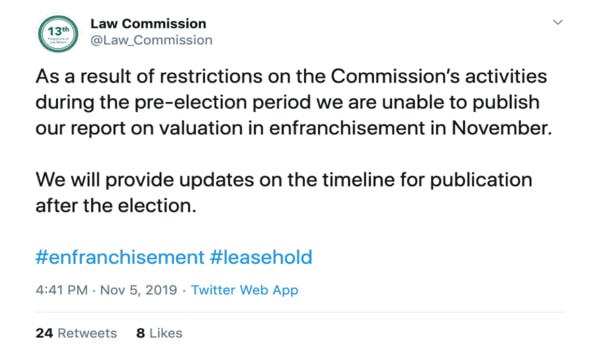
By Harry Scoffin
The snap general election has set back proposals to slash the costs of buying a freehold.
In a tweet, the Law Commission said on Tuesday that it has been forced to postpone the release of its report on valuation in enfranchisement “as a result of restrictions on the Commission’s activities during the pre-election period”.
According to the Institute for Government, “purdah” rules mean that arm’s-length bodies “should not compete with the election campaign” with big policy reveals.
LKP understands that the report on enfranchisement valuation models was due to be released next week.
It had already been pushed back, with the publication originally intended for October.
The announcement on Tuesday was met with frustration by campaigners.
National Leasehold Campaign co-founder Jo Darbyshire tweeted:
“Feels like leaseholders are always chasing a moving target. We need help now!”
Another leaseholder called for the leaking of the report, suggesting a conspiracy.
Concerns were raised last month that the first delay was political, with one valuer tweeting:
“Suspect they revealed their conclusions to the current Government (very different to Theresa May’s) and were told in no uncertain terms to enact a do-over. Recommendations without Government buy-in are rather pointless so we would envisage some degree of negotiation.”
Leasehold Solutions head Louie Burns came out in support, although no evidence has yet been presented to confirm the theory.
In response to the second postponement, Philip Rainey QC took to Twitter to sympathise with leaseholders thrown into disarray by the news:
“I’m sure that this will be a disappointment to reformers but the Commission had no choice; that’s how it works if an election is called.”
The Law Commission’s intention is to publish the final recommendations in January, ahead of its reports on reforming right to manage, commonhold and other aspects of enfranchisement set for the following month. The timing is still to be confirmed.
In its working paper, the Law Commission cautioned against expectations of radical change for consumers stuck in leasehold contracts:
“There is no suggestion that existing leaseholders should be able to obtain a freehold or lease extension without paying the landlord an appropriate price; our task is to propose reforms to improve the enfranchisement process, and to set out the options for reducing premiums that are payable by leaseholders while ensuring sufficient compensation is paid to landlords.”
It will be left for ministers to decide whether the new model of enfranchisement will favour the interests of landlords or tenants.





 Reform laws on track for ‘second half of 2020’, Martin Boyd tells Property Week
Reform laws on track for ‘second half of 2020’, Martin Boyd tells Property Week






















Savings to lessees could be achieved by making the enfranchisement/cost of lease extensions cheaper by reducing the costs and need for the lessees to pay the landlords legal and valuation fees
A typical statutory lease extension requires the lessee to pay the landlords legal and valuation fees and can easily amount to £2,000. The lessee own legal and valuation fees could easily amount to some £3,000. So, the lessee could easily end up paying some £5,000 in professional fees to extend a lease of say 72 years on a modest purpose built flat in the suburbs. This is frankly absurd. A statutory lease extension on such a property is hardly rocket science and after some 2,500 decided valuation cases it should be now be possible to build an algorithm which builds on the data from those settlements. Therefore, the interest of the freeholder will be preserved they will not get less, thus ensuring adequate compensation is paid . The lessee will pay less as there will not be the outrageous professional costs for them to pay, and the Government will have delivered on its promise. Certainly, for landlords who acquired their interest post 1993 can hardly complain that that an enfranchisement/lease extension was unforeseen and therefore should see their professional fees for a lease extension/enfranchisement either capped or borne entirely by themselves. I suspect such a proposal would appease the Great Estates as the professional fees the lessee pays at present as a proportion of the premium they receive is relatively small
Despair thee not!
Every “setback” has to be turned to our advantage!
In this case, had the report been published in November it’s impact could have been lessened by the Christmas break.
So now we can have the report early next year with a new Parliament and we can keep the pressure on without hindrance.
Stephen,
Whilst what you say appears on the surface to be good, it should be noted that freeholder accounts note that any attempt to make enfranchisement/ lease extension less complex and cheaper would affect their ability to continue trading.
There is a quoted stock – The Ground Rent Income Fund whose share price in the last three months has moved upwards steadily by around 8%
They mainly buy very long leases with indexed linked income on large purpose built blocks
In addition auction prices particular of late appear to also support the notion that large fundamental changes in the valuation of the price of enfranchisement and a lease extension seems highly unlikely
Why should a freeholder get more than 1% of the building value in compensation when that is possibly what they paid for the freehold interest in the first place ? The leaseholders add all the value, so the freeholder gets an unjustified windfall through the efforts of others.
because if you take away an asset from someone adequate and fair compensation should be paid
A developer like any other supplying party in a free market economy should be expected to get the best possible return – just as a homeowner will not feel guilty if they paid only a fraction of the price for the home they are now selling
Making purchasers aware prior to purchase what the cost of the ground rent really is and knowing how the cost of extending the lease will vary over time will enable purchasers to make informed decisions – lessee feel anger that they are not aware of the consequences of committing to a ground rent or taking on a shortish lease – education and transparency for lessee of what the terms mean is where the answer lies – not in capping rents without adequate compensation being paid –
No scientific factual based critique has been advanced to support 1% or the 10 yp formula of Mr Madders
The current formula has been the subject to various challenges and debate over 25 years . It was drafted at the time to deal with the landlords human rights to adequate compensation. The prices have increased in recent years in response to the collapse in interest rates . That is not unfair because the lessee in many cases would have seen the value of their investment rise when interest rate fall
It is the process that needs to be simplified and made cheaper and advantage should be taken of the huge amounts of data that can be extracted from the 2500 plus decided cases to build a simple algorithm
1% is fair, when that is what the freeholder may have paid for the freehold. The 1% will be based on an increase in the property value as well, usually because of the leaseholder’s efforts and general house price inflation. Why should someone who has invested so little in the value of the overall asset get a disproportionate gain, and adds no value to the asset during the period of the lease ?
Leasehold properties have sold in the recent past for as much as freehold ones, so leaseholders have not gained a discount on initial purchase.
The best thing is if all future ground rents are set to zero for all new properties. This kills the future for leasehold and removes an unnecessary 3rd party investor from people’s homes.
My question? What sort of business does it have to be that if their “customers were ever to be treated fairly, then their whole business model collapses? i
If they collect the ground rent which the lessee agreed to pay and extend the lease in accordance with the formula under the 1993 Act how can that be considered to be other than a fair way to conduct business
Stephen, I quote directly from the Fairhold note to their accounts in reference to the proposed Law Commission report:
“Such changes could materially reduce the level of income generated by the portfolio and be a significant threat to the company”
Except when the original disposal lfreehold sale) breached leaseholder right of first refusal – a criminal act under amended provisions Housing Act 1996.
In these circumstances the law provides that the victim leaseholders (+50% acting as a body) can, without time limit, force resale “on like terms” to original (illegal) disposal.
Alec :
Are you saying all freeholds of blocks of flats sold WITHOUT RFR offered to leaseholders are a criminal act under the Housing Act 1996 ?
Which clauses has words to say ” criminal act” and ” without time limit ” ?
Ollie: Yes – and I will extract relevant parts next couple days ( am busy elsewhere) and post.
Alec, Unfortunately there are so many loopholes in the Right of First Refusal as to render the right virtually useless?
For example, a developer can create a company to purchase the freehold and by dint of having shared directors they are connected companies and so avoid the legislation.
When they want to sell off the freeholds it is all too simple?
To get around the legislation they do not sell the freeholds!
What they do is to sell the company that holds the freeholds. That is why you will see a myriad of company names that own the freeholds.
Under existing provisions of part 1 of the Landlord and Tenant Act 1987 (as amended by the Housing Act 1996 (“the LTA 1987”) a majority of qualifying tenants in residential blocks of flats possess the right of first refusal in the event the existing landlord wishes to sell the freehold title to the premises in which they reside.
Under the amendments introduced by the Housing Act 1996, it is a criminal offence for a landlord to make a relevant disposal to which part 1 of the LTA 1987 applies, without first serving a section 5 notice on the qualifying leaseholders offering them right of first refusal and notifying them of the principal terms of a proposed contract.
The landlord notice under section 5 of part 1 of the LTA 1987 is the “offer notice”and must be served where the landlord intends to make a “relevant disposal” affecting the premises to which the LTA 1987 applies. The offer notice must be in writing and served on the qualifying tenants of the flats contained in the premises: “the constituent flats”. The offer notice must specify a period of time within which the majority of tenants may accept the offer. During the “protected period” the landlord must not dispose of the “protected interest” except to a person or persons nominated by the qualifying tenants for that purpose..The qualifying tenants may, within the specified period, accept or reject the offer. It is only on expiration of the protected period, and in the event the qualifying tenants decline to exercise the right of first refusal, that the landlord is then free to sell the freehold title to an unrelated purchaser – and only at a price not less that that offered to the qualifying tenants.
The legislation provides that where a freehold sale has taken place without issue of a section 5 notice in respect of premises to which part 1 of the LTA 1987 applies, the buyer must issue a section 3A notice informing the tenants of their right to purchase the freehold interest “on like terms” to the relevant disposal. In the continuing absence of a section 3A notice, the majority qualifying tenants can force resale to themselves on like terms, and this right continues until such time as a valid section 3A noitice is issued (including by any subsequent purchaser). In other words, the protected period time only begins to count from the date of issue of a section 3A notice – and if one has not been issued it remains outstanding (and binding on the buyer and any subsequent purchaser).
The criminal trade in freehold titles deprives leaseholders of the full material interest in their own leasehold properties. Predatory individuals and companies engaging in this criminal trade have been aided until now by the lack of any form of regulatory regime or adequate penalty – and consequently openly ply their nefarious trade in contempt of existing legislation.
As long as the criminal activities of individuals and companies are permitted to continue unchecked, (and enforcement is only available through the courts at disproportionate cost) leaseholders are left with rapidly declining property values and at the continuing mercy of unscrupulous and deep pocketed villains.
It is in this area of existing leaseholder ownership of flats that the Law Commission (and the CMA) must recommend root and branch reform.legislation.
I was reassured somewhat by Nick Hopkins at the leaseholders meeting with the Law Commission last year in Manchester – He said that the cost of enfranchisement would be greatly reduced, so making the Right of first refusal less relevant. He also suggested 10% of property value as an enfranchisement cost to preserve the freeholder’s human rights, when the freeholder may have paid considerably less than that for the freehold interest. I said that would make enfranchisement much more expensive than it is now for most leaseholders with long leases and low ground rents.
The leaseholder’s human rights need to take precedence where they are trapped in an unbalanced contract.
I hope the Law Commission suggest no more than 3%, preferably 1%, otherwise enfranchisement will still be out of reach for many.
If the valuation requirements of the 1993 Act were drafted to strike a balance between freeholders interest and leaseholders interest what has happened since 1993 that makes that valuation formula unfair.
I suspect the collapse in interest rates has caused prices for enfranchisement and lease extensions to rise significantly – however it must also be borne in mind that the collapse in interest rates caused property prices to rise and erode the value of mortgages. There would be uproar in the land if mortgagees wanted to change mortgage terms to reflect that inflation has wiped out much of the value of the debt they hold
If the formula is consistently applied and understood by purchasers then property prices will correctly reflect the costs of a lease extension in the future and therefore the lessee will not be adversely effected.
Again I make the point that the NPV of the ground rent should be disclosed PRIOR to the purchaser acquiring the lease.
As I and others have said Stephen, the ground rent is for no service to the leaseholders benefit at all, and in recent times leasehold properties have not sold at a big discount compared to freehold ones. That might be changing because more buyers are aware of the toxic nature of leasehold, although out of control service charges are the biggest issue for many in blighting a leasehold property, compared to ground rents.
There is no justification at all for having a remote 3rd party investor attached to someone’s home who adds no value, causes higher conveyancing costs and other expense for the leaseholder, and is a hindrance in getting the flammable cladding issue sorted out.
You try to justify the continuation of an antique system long past it’s sell by date, like the Thames ferrymen of old complaining about the first bridge being built.
I agree that ground rent is for no service at all – it is a financial burden on the property and needs to be valued and considered prior to purchase to ensure the overall consideration is fair.
Hence why I keep on stating that the NPV of the ground rent should be shown next to the premium paid for the lease